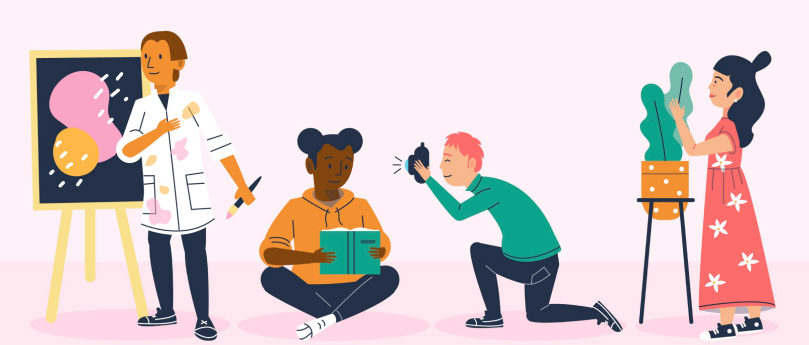Choosing a career is one of the most important decisions in life, yet for many students and even working professionals, it often feels like a confusing puzzle. While some people seem to have a clear path from the beginning, many others struggle with questions such as: What am I good at? What do I enjoy doing? What career will truly fulfill me?
One of the most effective ways to uncover answers is to look inward at our interests, passions, and hobbies. These aspects of our lives, often pursued naturally and without pressure, can serve as powerful clues to the kind of work we might enjoy and excel in. When properly explored, they can become the foundation of a career that is both successful and deeply satisfying.

Why Interests, Passions, and Hobbies Matter?
Interests are the things that capture our attention and curiosity. For example, a student may be interested in how mobile apps work, in reading history books, or in solving puzzles. Interests signal where our minds naturally like to wander.
Passions run deeper. They are activities or causes we care about so strongly that we feel motivated to spend time and effort on them. A passion for environmental conservation, for instance, could inspire someone to pursue a career in sustainability or policy-making.
Hobbies are activities we enjoy in our free time, often pursued for relaxation or fun. While not all hobbies translate directly into careers, they reveal patterns about our strengths, creativity, and preferred working styles. For example, someone who enjoys painting as a hobby may not necessarily become a full-time artist, but their visual creativity could point to careers in design, architecture, or advertising.
Together, these three elements are like a compass. They help us understand not only what we are good at, but also what gives us joy and meaning crucial ingredients for long-term career satisfaction.
The Link Between Personal Enjoyment and Professional Success
Studies show that people are more successful when they enjoy what they do. Enjoyment leads to persistence, which in turn develops expertise. A young person who loves tinkering with gadgets may spend countless hours experimenting, which builds problem-solving skills and technical knowledge. Over time, that hobby could evolve into a career in engineering, robotics, or product design.
Moreover, careers aligned with passions and interests tend to reduce burnout. Work feels less like a burden and more like an opportunity to apply one’s natural talents. This is not to say that every hobby should be monetized, but recognizing underlying patterns such as creativity, analytical thinking, or leadership can guide individuals toward fulfilling professions.
Identifying Career Clues in Everyday Life
Many people underestimate how much their daily activities reveal about their career preferences. Here are some ways to uncover these clues:
Notice What Energizes You
Think about activities that make you lose track of time. Do you enjoy debating ideas, creating digital art, organizing events, or mentoring others? These moments often highlight areas where a career could be developed.
Reflect on Childhood Dreams
Children often express pure interests before societal pressures intervene. A childhood fascination with space might hint at careers in astronomy, aerospace, or science communication.
Analyze Your Hobbies
Break down what your hobbies involve. For example, playing team sports reveals teamwork and leadership skills, while blogging demonstrates communication and creativity. Each hobby carries transferable skills.
Ask for Feedback
Friends, teachers, or mentors often notice strengths we overlook. If people frequently praise your storytelling, empathy, or organizational skills, those qualities could point to fitting career options.
Experiment with Opportunities
Internships, volunteering, or side projects can help test if an interest is something you’d want to pursue professionally. Sometimes, trying something in a real-world context confirms whether it’s a passion or simply a pastime

Examples of Turning Passions into Careers
Love for Gaming → Game Design or Esports Management:
Many students who spend hours gaming may be encouraged to think beyond “just playing.” Skills in strategy, coding, and storytelling could lead to game development, virtual reality design, or even esports management.
Interest in Cooking → Culinary Arts or Food Technology:
Someone who loves experimenting with recipes might find satisfaction in becoming a chef, food blogger, nutritionist, or food technologist.
Hobby of Photography → Media, Marketing, or Journalism:
Photography sharpens visual communication skills. Careers could range from photojournalism to advertising, filmmaking, or social media marketing.
Passion for Helping Others → Healthcare or Counselling:
A natural desire to care for people can evolve into careers in nursing, psychology, social work, or teaching.
Curiosity About How Things Work → Engineering or Research:
If you enjoy dismantling gadgets or asking “why” about everything, careers in engineering, product design, or scientific research might be a natural fit.
Balancing Practicality with Passion
It is important to acknowledge that not every passion can immediately become a sustainable career. For example, someone passionate about music may not make a living solely as a performer. However, they can explore related paths such as sound engineering, teaching music, or working in media. A smart approach is to find the intersection of passion, skill, and market demand. This balance ensures that your career is not only enjoyable but also financially stable. Sometimes a hobby can remain a joyful outlet while you build a career in a related or complementary field.
The Role of Career Counselling and Mentorship
Exploring interests and passions can feel overwhelming, especially for students facing external pressures from family or society. This is where career counselling and mentorship become invaluable. Professional career counsellors use assessments, personality tests, and one-on-one guidance to help individuals align their interests with real-world opportunities. Mentors, on the other hand, provide lived experiences. A mentor in your area of interest can share insights about the challenges, skills required, and growth prospects in that field. Together, they help transform vague passions into structured career plans.
Steps to Turn Insights into Action
Self-Assessment:Make a list of your top five interests, passions, and hobbies.
Skill Mapping: Identify the skills connected to each (creativity, problem-solving, communication, etc.).
Career Research:Explore professions where those skills are in demand.
Seek Guidance:Consult career counsellors, mentors, or online career platforms.
Create a Plan: Set short-term and long-term goals with practical steps.
In conclusion our interests, passions, and hobbies are not random; they are windows into our personality, values, and strengths. By paying attention to what we enjoy and excel at, we can uncover meaningful career directions. While practical considerations such as financial stability and job demand matter, combining them with personal fulfillment creates the ideal balance.
Ultimately, a career chosen with self-awareness is more likely to bring both professional success and personal happiness. As the saying goes: “Choose a job you love, and you’ll never have to work a day in your life.”






